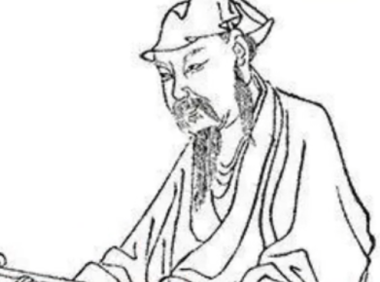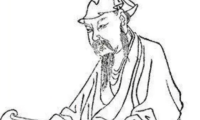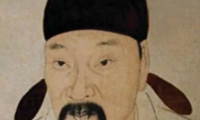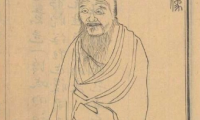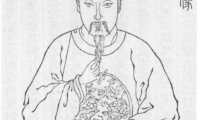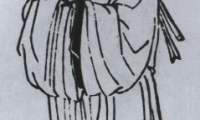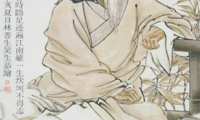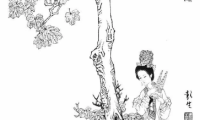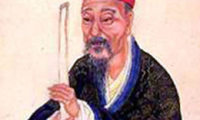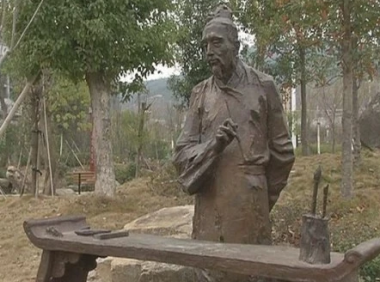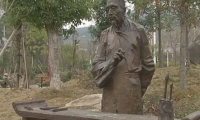-
Wang Yuanding: Boudoir Repining
凭阑人·闺怨 王元鼎 垂柳依依惹暮烟, 素魄娟娟当绣轩。 妾身独自眠, 月圆人未圆。 Boudoir Repining To the Tune of Person Learning on the Railing Wang Yuanding Swaying in the breeze are willows in the mist of twilight, The splendid boudoir is bathed in the soothing moonlight. I have to sleep alone at night, The moon is full, I’m yearning to reunite. (周方珠 译) Resentment Heard in the Bower to the tune of Person Leaning on the Railing Curling up over the willows is the smoke approaching night, Hanging above outside the painted window is the moon chaste and white. Sleeping quietly I am lonely in a plight, The moon is full, my man is out of sight. (辜正坤 译)...
- 0
- 0
- 64
-
Qiao Ji: Roaming on Mourning Day
折桂令 客窗清明 乔吉 风风雨雨梨花, 窄索帘栊, 巧小窗纱。 甚情绪灯前, 客怀枕畔, 心事天涯。 三千丈清愁鬓发, 五十年春梦繁华。 蓦见人家, 杨柳分烟, 扶上檐牙。 Roaming on Mourning Day Qiao Ji Pear blossoms fade in wind and rain. On narrow window frame I lean By delicate window screen. In what mood before lamplight can I remain? A roamer whose head on the pillow lies, And whose heart to the end of the earth flies. My grief as long as an old man’s hair white, Fifty years have passed like a vernal dream overnight. Suddenly a house comes to sight, Where smokelike willow leaves Adorn the tilting eaves. (许渊冲 译) Thoughts by the Window of the Hostel at Qingming Festival to the tune of Plucking Cassia Qiao Ji Pear blossoms in the wind and rain flying Past the curtains with ropes fine, Over the veiled window of a delicate little pattern, How I feel wretched sitting alone before the lantern, Or head on pillow with traveller’s thoughts and grief strong, Going far, far away to the end of the earth. My melancholy and white hair are three thousand feet long, Fifty years being past in a spring dream of prosperity and mirth. Suddenly I see a thatched house, Shaded by smoky willows so large…...
- 0
- 0
- 59
-
Shao Hengzhen: Early Summer of the Zhenxi Stream
贞溪初夏 邵亨贞 楝花风起漾微波,野渡舟轻客自过。 沙上儿童临水立,戏将萍叶饲黄鹅。 Early Summer of the Zhenxi Stream Shao Hengzhen Chinaberry trees begin to flower in wind that ripples the stream; At the ferry a traveler himself has to do the ferrying. On the beach a playful kid stands by the waters, Feeding young geese with leaves of duck weed. (王晋熙、文殊 译)...
- 0
- 0
- 65
-
Wu Xiyi: An Incident Recorded in the Mountains to the tune of the Moon Palace ~ 《蟾宫曲·山间书事》 吴西逸 with English Translations
"Chan Gong Qu·Shan Jian Shu Shi" is a short song composed by Wu Xiyi, a Yuan Dynasty opera writer. This song depicts the scene of seclusion in the mountains, showing the author's attitude of wandering among the mountains and rivers and no longer caring about worldly affairs. It seems joyful, but in fact it contains the meaning of keeping silent to avoid disaster. 《蟾宫曲·山间书事》是元曲作家吴西逸创作的小令。这支曲子描绘的是山中隐居生活的图景,表明作者游逸于山水之间,不再过问世事的态度。看似欢悦,实则蕴含缄口避祸之意。 《蟾宫曲·山间书事》 吴西逸 系门前柳影兰舟,烟满吟蓑,风漾闲钩。石上云生,山间树老,桥外霞收。玩青史低头袖手,问红尘缄口回头。醉月悠悠,漱石休休,水可陶情,花可融愁。 An Incident Recorded in the Mountains to the tune of the Moon Palace Wu Xiyi Mooring at the door shaded by willows is the orchid-engraved boat.The smoky fog drowns the fisherman's palm-leaf overcoat.The fishing hook hanging idle in the water the gentle wind blows,The white cloud round mountain rocks slowly flows.In the mountains gaunt trees grow,Beyond the village bridge disappears the sunset glow.I lower my head thinking, in hand a history book,Asked about worldly affairs, back in silence I look.The drunken moon is there, clear and high,The water around the rock is heard to murmur and sigh.The water can purify my feelings well,My melancholy, the flowers can dispel....
- 0
- 0
- 59
-
Wu Xiyi: An Idle Inscription ~ 《天净沙·闲题》 吴西逸 with English Translations
"Tian Jing Sha·Xian Ti" is a Yuan Dynasty song written by Wu Xiyi, a writer in the Yuan Dynasty. This "Xian Ti" expresses the homesickness of a wanderer. The use of clouds flying low in the sky and the water flowing eastward in the river to set off the sadness of parting is not new, but the words "full of clouds" and "continuous" outline the atmosphere of hatred overflowing the world and lingering sorrow, and also forced out the sentence "Why is there so much hatred for parting?" 《天净沙·闲题》是元代作家吴西逸创作的一首元曲。这首《闲题》抒写游子思乡愁绪。以满天低飞之云、一江流东之水来衬托离愁别绪,虽不新鲜,但“飞满”、“不断”之语却勾勒出恨溢天地、愁绪绵绵的氛围,也逼出了“何事离多恨冗”一句。 《天净沙·闲题》 吴西逸 楚云飞满长空,湘江不断流东。何事离多恨冗?夕阳低送,小楼数点残鸿。 An Idle InscriptionTo the Tune of Sky-clear Sand Wu Xiyi Over the Chu State clouds are drifting across the sky,The Xiang River keeps flowing eastward and riding high.Life is full of parting and grief, I don't know why.Against the evening glow,A few swans past the tower gracefully fly....
- 0
- 0
- 61
-
Wu Xiyi: Tune of Long-lived Sun ~ 《寿阳曲·四时至》 吴西逸 with English Translations
这支小令描写画楼中一位女子的相思愁绪。她心事重重,难以排遣。读诗写词都只能更增添她的烦闷,秋天的萧条景象也引发起她的愁思万缕,就连天空飞过的大雁,在她眼里也摆成了愁字。小令写得情思缠绵,委婉动人。 《寿阳曲·四时至》 吴西逸 萦心事,惹恨词。更那堪动人秋思。画楼边几声新雁儿,不传书摆成个愁字。 Tune of Long-lived SunFour Seasons Wu Xiyi Grief heavy on my heartCan't be written in word.What can I do to keep autumn apart?Beyond my painted bower is heardThe newcome wild geese's cry.They bring no letter but write "loneliness" in the sky....
- 0
- 0
- 50
-
Wu Xiyi: Tune: Song of the Clear River ~ 《清江引·秋居》 吴西逸 with English Translations
《清江引·秋居》是元代作曲家吴西逸创作的一首小令,全曲文字简洁,意境潇洒,色彩淡雅,格调清新,自雁、雪、云、月、星斗,组成一幅静谧清凉的 秋夜画面,素雅之色衬淡泊之情,深刻地表达了作者远离污浊的尘世,回到大自然的怀抱的追求,保持高雅的情操的向往。 《清江引·秋居》 吴西逸 白雁乱飞秋似雪,清露生凉夜。扫却石边云,醉踏松根月,星斗满天人睡也。 Tune: Song of the Clear RiverAn Autumn Night Wu Xiyi White wild geese fly pell-mell like autumn snow;In the cool night clear dew-drops grow.Drunk, I tread on the pine-tree's root steeped in moonlightAnd wipe the stone clean of cloud white.Under the starry sky sleepy I lie....
- 0
- 0
- 59
-
Shao Hengzhen: Early Summer of the Zhenxi Stream ~ 《贞溪初夏》 邵亨贞 with English Translations
"Early Summer in Zhenxi" is a seven-character quatrain written by Shao Hengzhen, a writer in the late Yuan Dynasty and early Ming Dynasty. It is a poem describing the early summer scenery in the rural areas of Jiangnan. 《贞溪初夏》是元末明初文学家邵亨贞所作的一首七言绝句,是一首描写江南农村初夏景色的诗。 《贞溪初夏》 邵亨贞 楝花风起漾微波,野渡舟轻客自过。沙上儿童临水立,戏将萍叶饲黄鹅。 Early Summer of the Zhenxi Stream Shao Hengzhen Chinaberry trees begin to flower in wind that ripples the stream;At the ferry a traveler himself has to do the ferrying.On the beach a playful kid stands by the waters,Feeding young geese with leaves of duck weed....
- 0
- 0
- 62
-
Zhang Yining: Begonia ~ 《秋海棠》 张以宁 with English Translations
Zhang Yining was a writer in the late Yuan Dynasty and early Ming Dynasty. He was from Gutian (now Ningde, Fujian). He was talented, well-read and well-remembered. He was well-known at the time and was called "Little Scholar Zhang". In the Taiding period, he was selected as a Jinshi for his Spring and Autumn Annals. He was promoted to Hanlin Scholar. After the Ming Dynasty destroyed the Yuan Dynasty, he was appointed as a Scholar. He was sent as an envoy to Annan and died on the way back. Yining was good at poetry and wrote "Cuiping Collection" and "Chunwang January Examination". Zhang Yining advocated the restoration of the past in his poetry theory, which opened a precedent for the Ming Gao Bing's theory of restoration. 张以宁,元末明初文学家。古田(今属福建宁德)人。有俊才,博学强记,擅名于时,人呼“小张学士”。泰定中,以春秋举进士。官至翰林侍读学士。明灭元,复授侍讲学士。奉使安南,还,卒于道。以宁工诗,著有《翠屏集》、《春王正月考》等。张以宁论诗主张复古,为明高棅复古理论开了先河。 《秋海棠》 张以宁 软渍红稣百媚生,嫣然一笑欲倾城。不须更乞春阴护,绿叶低遮倍有情。 Begonia Zhang Yining With all charms lithe, rubicund and tender,She is unrivaled in pulchritude with a smile enchanting and winsome.It is dispensable to implore the god for vernal-shade shelter.Under the cover of green foliage she appears exceptionally sentimental and handsome....
- 0
- 0
- 82
-
Yuan Kai: Sitting at Night in an Alien Land ~ 《客中夜坐》 袁凯 with English Translations
"Sitting at Night in a Foreign Land" expresses the author's deep longing for his hometown when he was living in a foreign land, sitting alone late at night and listening to the calls of wild geese. 《客中夜坐》表达了作者客居他乡,深夜独坐,听闻大雁的叫声而引发的对故乡深深的思念之情。 《客中夜坐》 袁凯 落叶萧萧淮水长,故园归路更微茫。一声新雁三更雨,何处行人不断肠。 Sitting at Night in an Alien Land Yuan Kai(1) Leaves fall shower by shower on the river long.Where can the way to my native garden be found?The wild geese pierce the midnight rain with their new song.O how can my heart not break on my way homebound! (1) Persecuted by the emperor, Yuan Kai escaped death only by pretending to be mad....
- 0
- 0
- 52
-
Dula Sa: Frontier Songs (II) ~ 《上京即事二首(其二)》 萨都剌 with English Translations
This poem is about hunting. The autumn wind blows hard, the grass turns yellow, and the hunting season has arrived. The nobles ride on fine horses with strong bows and gallop across the vast grassland. In the evening, they call for the hawks to return, and hang the captured beasts on their horses. 这首诗写的是狩猎的情况。秋风劲吹,牧草枯黄,逐围打猎的季节到来了。王孙贵族带着劲弓,骑着骏马,驰骋在浩瀚无限的草原上。晚上,吆喝着鹰儿归来,马上悬挂着捕获的野兽。 《上京即事二首(其二)》 萨都剌 紫塞风高弓力强,王孙走马猎沙场。呼鹰腰箭归来晚,马上倒悬双白狼。 Frontier Songs (II) It's hard to bend the bow in high wind at Great Wall,But the young lords on hunting ground ride left and right.Arrow at waist, they come back late with hawks they call.On both sides of the saddle hanging two wolves white....
- 0
- 0
- 68
-
Wang Yun: An Evening View of Linwu Hall ~ 《后庭花·晚眺临武堂》 王恽 with English Translations
Wang Yun's poems are elegant, simple and fluent, and his style is similar to that of Su Shi and Xin Qiji. In terms of content, his poems can be divided into two periods. In the early period, there is a sense of vicissitudes. This is because Wang Yun was 6 years old when the Jin Dynasty fell, and when he was 40 years old, the Song Dynasty fell. The times were turbulent. In addition, in the early period, he was in the officialdom, "like a rice seedling in the field", and he was used and dismissed by others, and he was not successful. In the later period, because the Yuan Dynasty unified the north and the south, the situation was stable, and "people were at peace and rice was cheap", so his works in his later years were peaceful and elegant, with more personal lyric and social works, singing "singing to the wine must be comfortable". 王恽的词,清丽雅正,平易通达,风格接近苏轼、辛弃疾。从内容上看,他的词可分前后两个时期。前期词中,多含沧桑之感,这是由于王恽6岁时金亡,40多岁宋亡,时势动荡,加之他前期在官场里,“似田间秧马”,用舍由人,并不得志。到了后期,由于元朝统一南北,局势大定,“人安米贱”,所以他晚年作品表现为和平淡雅,个人抒情和应酬之作较多,高唱"对酒当歌须适意"。 《后庭花·晚眺临武堂》 王恽 绿树连远洲,青山压树头。落日高城望,烟霏翠满楼。木兰舟,彼汾一曲,春风佳可游。 An Evening View of Linwu HallTo the Tune of Flowers in the Backyard Wang Yun Green woods link to the remote sandbar,Dark green hills are the cloak of the trees afar.Glory of the dusk shines upon the town tower,Splendid Linwu…...
- 0
- 0
- 60
-
Wang Yun: Ode to Willow Wreath ~《双鸳鸯·柳圈辞》 王恽 with English Translations
This short song is gentle, pure and beautiful, resentful but not revealing, and has the charming and graceful flavor of a short poem. Ancient Chinese literati were best at writing about sadness in a poetic way, and using this poetic feeling to resist sadness. 这支小令温柔清美,怨而不露,带有小词的旖旎婉曲的风味。中国古代的文人,最善于将悲愁写得诗意十足,又以这种十足的诗意去抵御悲愁。 《双鸳鸯·柳圈辞》 王恽 暖烟飘,绿杨桥,旋结柔圈折细条。都把发春闲懊恼,碧波深处一时抛。 Ode to Willow WreathTo the Tune of Double Love-birds Wang Yun Warm and gentle is the breeze,In the willow grove is the bridge,Weave the soft willow twigs into wreaths.And throw them away into the limpid river,Let them wash away my fret with water....
- 0
- 0
- 57
-
Wang Yun: Tune: Joy of Calm Lake ~ 《平湖乐·尧庙秋社》 王恽 with English Translations
This song depicts the local folk customs by describing the activities of Yao Temple Community Day. It expresses the author's ambition to benefit the people and share happiness with them. Many allusions are used in the song, but the overall style is still simple and plain, which is unique. 此曲通过描写尧庙社日活动情景,展现了当地的民风民俗。抒发了作者为民谋福,与民同乐的志向。曲中多处用到典故,但整体仍不失通俗朴茂的本色,别成一格。 《平湖乐·尧庙秋社》 王恽 社坛烟淡散林鸦,把酒观多稼。霹雳弦声斗高下,笑喧哗,壤歌亭外山如画。朝来致有,西山爽气,不羡日夕佳。 Tune: Joy of Calm LakeAutumn Festival at Emperor Yao's Temple Wang Yun The incense on the altar fadesAnd crows disperse into the glades.Wine cup in hand and bumper harvest in view,I hear strings rumbling low and high,Mingle with cheerful cry.Beyond Labor Pavilion hills look like pictures fair.At dawn the western hills exhale fresh air.Why should I envy Southern Mountain hue?...
- 0
- 0
- 57
-
Wang Yun: Lotus-Pickers ~《平湖乐·采菱人》 王恽 with English Translations
The author uses plain language to vividly describe the feelings of the lotus pickers who miss their hometown. The first paragraph describes the beauty of the foreign land, but "it is not my land after all", pointing out the intention to return. The more beautiful the scenery is, the more it can contrast the strong homesickness and the strong desire to return. 作者以白描手法,形象生动地写出采莲人怀念故乡之情思。前段写他乡之美,但“终非吾土”,点出归意。景色写得愈美,愈能反衬思乡之烈,归心之切。 《平湖乐·采菱人》 王恽 采菱人语隔秋烟,波静如横练。入手风光莫流转,共留连,画船一笑春风面。江山信美,终非吾土,问何日是归年? Lotus-Pickersto the tune of Enjoyment on the Peaceful Lake Wang Yun Amid the autumn some are heard the lotus-plucking girls, charm,Like a white ribbon the water looks calm.Be careful not to this beautiful scene destroy,Together we stay and ourselves enjoy,In painted boats are smiling faces like spring so fair,Indeed, this land is beautiful beyond compare.Alas, it’s not my native place I roamAnd wonder when I can be back at my home?...
- 0
- 0
- 64
-
Zhang Kejiu: Enjoying Leisure ~ 《四块玉·乐闲》 张可久 with English Translations
"Le Xian" is a short song that describes the feeling of living in leisure and being proud of the world. The three words "Seeking unrestrainedness" dominate the whole poem, fully revealing the poet's desire to refuse the hustle and bustle of the world and to be noble and self-reliant. The infinite charm of Jiangnan is the most ideal place to retreat from the world. Slowly sipping tea, savoring sweet fruits, and admiring flowers and plants, such a quiet, leisurely, and peaceful life of seclusion is indeed fascinating. 《乐闲》是一首叙写闲居傲世之情的小令。“寻潇洒”三字统领全诗,把诗人谢绝尘嚣、高洁自持的意愿完全表露出来,而风情无限的江南正是最理想的避世归隐之地。慢慢地品尝清茶,品味香甜的瓜果,观赏花草,这样清静悠闲、恬然自娱的隐逸生活,确实令人神往。 《四块玉·乐闲》 张可久 远是非,寻潇洒。地暖江南燕宜家,人闲水北春无价。一品茶,五色瓜,四季花。 Enjoying Leisure Zhang Kejiu I keep away from gossip,I seek the unconventional.The earth is warm: in the South the time is ripe for swallows to nest;Man is at leisure: north of the river spring is priceless.Seven kinds of tea,Five-colored melons,Four seasons of flowers....
- 0
- 0
- 55
-
Chen Cao’an: Tune: Sheep on the Slope ~ 《山坡羊·叹世·晨鸡初叫》 陈草庵 with English Translations
"Shanpoyang·Morning Cocks Crow" is a work by Yuan Dynasty Sanqu writer Chen Cao'an. This short song expresses the author's lament that people rushing for fame and fortune will eventually turn into smoke and dust. It dissuades people from giving up the pursuit of fame and fortune and returning to the countryside. It also fully demonstrates the author's beautiful yearning for returning to nature. 《山坡羊·晨鸡初叫》是元代散曲家陈草庵的作品。此小令表达了作者感叹世人为了功名利禄而奔波,最终都会化作烟尘一吹而散。劝阻人们放弃争名夺利而卸甲归田。也充分说明了作者对于回归自然的美好向往。 《山坡羊·叹世·晨鸡初叫》 陈草庵 晨鸡初叫,昏鸦争噪,那个不去红尘闹?路遥遥,水迢迢,功名尽在长安道。今日少年明日老。山,依旧好,人,憔悴了。 Tune: Sheep on the Slope O WorldChen Cao'anAt dawn cock crows,At dusk caw crows.Who to vanity fair is not eager to go?Long long the way;Far far the stream.Only in the capital can you fullfil your dream.Tomorrow old will grow the youth of today.The hills are as green as before,But the prime of youth is no more....
- 0
- 0
- 61
-
Reply to Lu Songzhai to the tune of Life-giving Sun~ 《寿阳曲·答卢疏斋》 珠帘秀 with English Translations
"Shouyang Qu·Reply to Lu Shuzhai" is a short song composed by Zhu Lianxiu in the Yuan Dynasty. This song is full of deep affection and resentment, showing Zhu Lianxiu's deep love for Lu Zhi. In the song, the author expresses gratitude to Lu Zhi for the song before leaving, and on the other hand, she pours out her grief and anger as a singer. The whole song expresses the strong emotional ups and downs at the time of parting, which is really touching. 《寿阳曲·答卢疏斋》是元代珠帘秀所作的散曲小令。这首小令充满深情与怨恨,表现了珠帘秀对卢挚的一往情深。曲中作者一方面对卢挚的临行赠曲表示感谢,另一方面倾吐了自己做歌女的悲愤。整个小令将离别时强烈的情感起伏,表现得一波三折,真切感人。 《寿阳曲·答卢疏斋》 珠帘秀 山无数,烟万缕。憔悴煞玉堂人物。倚篷窗一身儿活受苦,恨不得随大江东去。 Reply to Lu Songzhaito the tune of Life-giving Sun Mountains are countless,Mist is boundless.How miserable is my scholarly man!Holding on the windowsill that is tan,I, though being alive, suffer a lot, too,Wishing I could go to him following the eastbound river in view....
- 0
- 0
- 66
-
Liu Chi: Yen Erh Mei ~ 《眼儿媚·烟草萋萋》 刘基 with English Translations
"Eyes of Charm: Thick Grasses on the West Side of the Small Building" is a poem written by Liu Ji, a writer in the late Yuan Dynasty and early Ming Dynasty. The first part of the poem depicts the autumn scenery to depict the sorrow of a woman missing her lover, highlighting her eagerness to see her lover return. The second part directly depicts the woman's psychological activities from longing to complaining. The whole poem is like a painting, with delicate brushwork and vivid description. The emotion is expressed in a subtle and implicit way, with a warm and moving feeling. 《眼儿媚·萋萋芳草小楼西》是元末明初文学家刘基创作的一首词。此词上片通过对秋景的描画从侧面形象渲染了思妇的满怀愁绪,突出其盼望远游人归来的急切心情;下片则直接刻画闺妇由盼到怨的心理活动。全词衬景如画,笔触精细,描摹生动,情感抒发委婉含蓄,温情脉脉,哀婉动人。 《眼儿媚·烟草萋萋》 刘基 烟草萋萋小楼西,云压雁声低。两行疏柳,一丝残照,数点鸦栖。 春山碧树秋重绿,人在武陵溪。无情明月,有情归梦,同到幽闺。 Yen Erh Mei Liu Chi West of the little tower the smoky grass has grown a fleece;Blanketing cloud muffles the cry of the geese;A slender pair of willow rows,A single thread of fading light,A thousand specks, the roosting crows. The mountain trees like jade in spring, how green their autumn look;Her man's away beside the Wu Ling brook.The loveless light of the bright moon,The love-filled dream of his returnTogether flood her lonely room....
- 0
- 0
- 58
-
Cai Shun Gathered Mulberries for His Mother ~ 《二十四孝·蔡顺拾葚供亲》 郭居敬 with English Translations
The story of Cai Shun was also selected in the Twenty-Four Filial Exemplars, but there are two interesting points: First, we will find that the details of "biting fingers and feeling heartache" are the same as Zengzi's narration in the Twenty-Four Filial Exemplars. This shows that behind the behavior of filial sons lurks a conventional expression of behavioral patterns, so there will be repetition. Second, in order to avoid repetition, the author of the Twenty-Four Filial Exemplars used the content of "biting fingers and feeling heartache", but when writing about Cai Shun, he bypassed this historical story and used the story of "picking mulberry leaves to feed parents", which is not recorded in the Book of the Later Han Dynasty. Third, Cai Shun was afraid that his mother would be afraid of thunder after her death, so he often cried around the tomb on thunderstorms. This plot is similar to the "Hearing Thunder and Crying at the Tomb" by the filial son Wang Pei in the Twenty-Four Filial Exemplars. Although modern people will have all kinds of thoughts when reading these historical filial sons and filial deeds, or they may not understand, or they may hate their artificiality, or they…...
- 0
- 0
- 53
-
Xianyu Biren: Return of Fishing Boats ~ 《普天乐·远浦帆归》 鲜于必仁 with English Translations
"Putianle·Eight Views of Xiaoxiang" is a set of Sanqu written by Yuan Dynasty writer Xian Yu Biren. These eight pieces of music are descriptive works, and the content is taken from the eight paintings of "Eight Views of Xiaoxiang" by the Northern Song Dynasty painter Song Di. The lyrics are gorgeous, the artistic conception is far-reaching, and the realm is broad. A set of Sanqu written by Yuan Dynasty writer Xian Yu Biren. These eight pieces of music are descriptive works, and the content is taken from the eight paintings of "Eight Views of Xiaoxiang" by the Northern Song Dynasty painter Song Di. The lyrics are gorgeous, the artistic conception is far-reaching, and the realm is broad. 《普天乐·潇湘八景》是元曲作家鲜于必仁创作的一组散曲。这八首曲子为写景之作,内容取自北宋画家宋迪的八幅组画“潇湘八景”为写景之作。曲文华美,意境辽远,境界开阔。 《普天乐·远浦帆归》 鲜于必仁 水云乡,烟波荡。平洲古岸,远树孤庄。轻帆走蜃风,柔橹闲鲸浪。隐隐牙墙如屏障,了吾生占断渔邦。船头酒香,盘中蟹黄,烂醉何妨。 Return of Fishing BoatsTo the Tune of Jubilation All over the World Xianyu Biren Waters vast and mighty,Waves rolling and misty.Smooth sandbar and the old bank,Distant trees a hamlet tiny.With wind swift boats along the river sailing,Across waves fishermen sculling and rowing.Like a forest the ivory-decorated masts standing,Carefree I spend the rest of my life fishing.Drinking mellow wine on board,With crabs delicious and hot,As drunk as a lord, why not?...
- 0
- 0
- 56
-
Ren Yu: The Recall of Qiantang River in the Past to the tune of Prelude to the Limpid River ~ 《清江引·钱塘怀古》 任昱 with English Translations
"Qingjiang Yin Qiantang Huaigu" is a short song written by Ren Yu, a Yuan Dynasty ci writer. This song uses personification to describe the scenery of Qiantang River, and uses the Qiantang landscape with a specific historical background to express the author's nostalgia for the past and his country, and expresses the author's euphemistic sadness. The whole song uses personification to express emotions through scenery, and expresses the author's inner grief and sorrow vividly. 《清江引·钱塘怀古》是元代散曲家任昱所写的一首小令。这首小令使用拟人化手法描写了钱塘江水的景色,以具有特定历史背景的钱塘山水来寄寓作者的怀古伤国之情,表达了作者内心的委婉悲切。全曲通过拟人手法,借景抒情,将作者内心的悲痛与哀婉表达地淋漓尽致。 《清江引·钱塘怀古》 任昱 吴山越山山下水,总是凄凉意。江流今古愁,山雨兴亡泪,沙鸥笑人闲未得。 The Recall of Qiantang River in the Pastto the tune of Prelude to the Limpid River Ren Yu In the Wu and Yue states mountains and waters that appearAnd suggest a feeling so sad and drear,The following rivers are the flow of grief present and past,The rain over mountains is but the tears for the state outcast.Only gulls free, laughing at men fully occupied with a life overcast....
- 0
- 0
- 52
-
Xianyu Biren: Mountain Mist over a Country Fair To the Tune of Jubilation All over the World ~ 《普天乐·山市晴岚》 鲜于必仁 with English Translations
"Putianle·Eight Views of Xiaoxiang" is a group of Sanqu written by Yuan Dynasty composer Xianyu Biren. These eight songs are descriptive works, and the content is taken from the eight paintings of "Eight Views of Xiaoxiang" by Northern Song Dynasty painter Song Di. The lyrics are gorgeous, the artistic conception is far-reaching, and the realm is broad. 《普天乐·潇湘八景》是元曲作家鲜于必仁创作的一组散曲。这八首曲子为写景之作,内容取自北宋画家宋迪的八幅组画“潇湘八景”为写景之作。曲文华美,意境辽远,境界开阔。 《普天乐·山市晴岚》 鲜于必仁 似屏围,如图画。依依村市,簇簇人家。小桥流水间,古木疏烟下。雾敛晴峰铜钲挂,闹腥风争买鱼虾。尘飞乱沙,云开断霞,网晒枯搓。 Mountain Mist over a Country FairTo the Tune of Jubilation All over the World Xianyu Biren Like a painted screen,Like a picture serene.A dimly visible country fair,With households well laid out there.Tiny bridge across the stream flowing,Around old trees smoke curling.With mist and clouds dispersed the sun shines bright,Over fish and shrimps at the fair dealers cry out.Clouds of dust fly high,Clearing up is the sky,Fishing nets hung out in the sunshine....
- 0
- 0
- 57
-
Stirring Love to the tune of Light Pink: 《小桃红·春情》 任昱 with English Translations
Ren Yu, also known as Zeming, was a native of Siming (now Ningbo, Zhejiang). He was a contemporary of Zhang Kejiu and Cao Mingshan. He was fond of traveling when he was young and never served as an official. His short songs were widely sung by courtesans. 任昱,字则明,四明(今浙江宁波市)人。与张可久、曹明善为同时代人,少时好狎游,一生不仕。所作散曲小令在歌妓中传唱广泛。 《小桃红·春情》 任昱 深沉院落牡丹残,懒揭珠帘看,青杏园林管弦散。翠阴间,数声黄鸟伤春叹。离怀未安,相思不惯,独倚小阑干。 Stirring Loveto the tune of Light Pink Peonies fade and die in the courtyard dark and deep,But I have no heart to hold up the curtain to watch the scene.The apricot garden is no longer music and songs to keep.In the shade of the trees green,Orioles chirp, seeming worried for the passage of spring.Still upsetting me are the parting feelings so strong,I bear not this lovesickness for long,Alone, standing by the low balustrade with head hung....
- 0
- 0
- 52


















